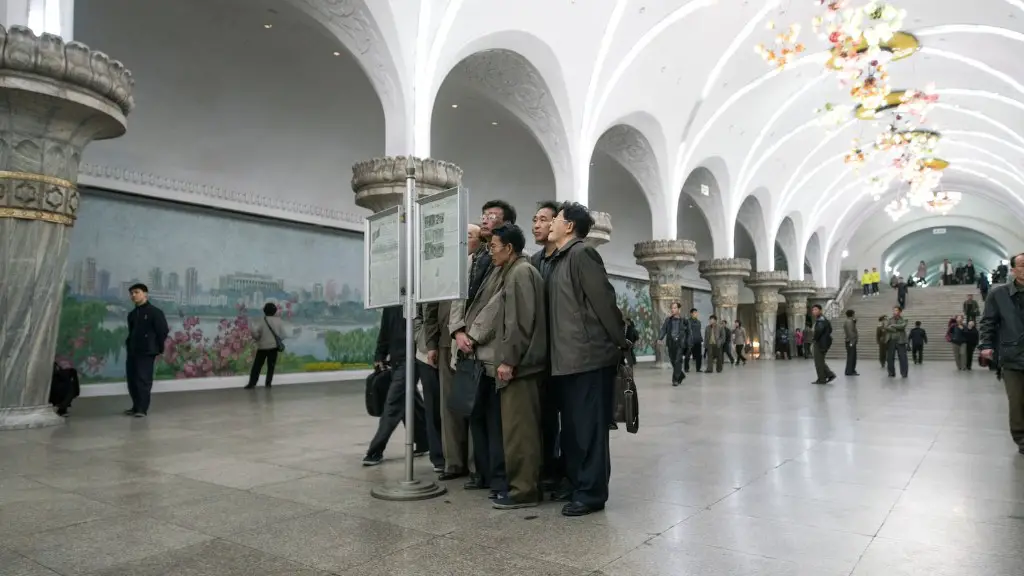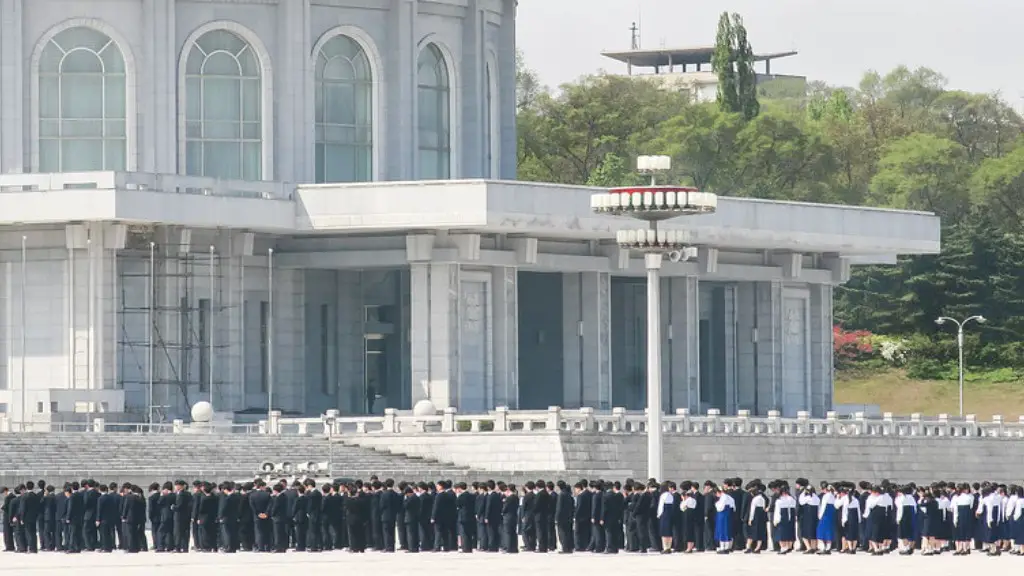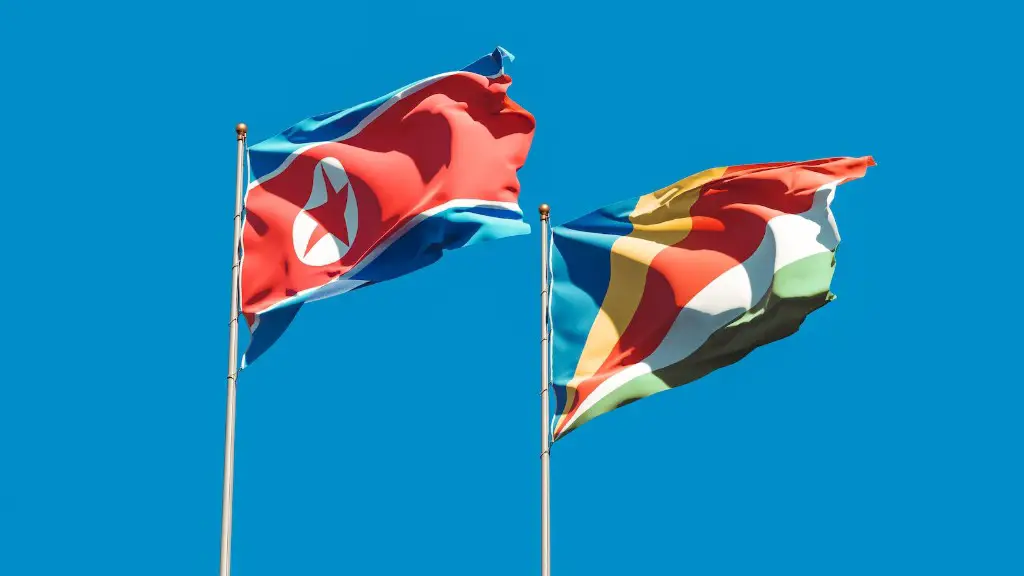Background of North Korea’s Political Ideology
North Korea is a communist dictatorship headed by Kim Jong-un, since his father and predecessor, Kim Jong-il, died in 2011. North Korea is an authoritarian government, which means it does not tolerate any form of dissent and dissenters may faces stiff punishments. North Korea is economically impoverished and has virtually no contact with most of the outside world. It is an isolated state, with few diplomatic relations, and is heavily reliant on international aid.
The official ideology of North Korea is called “Juche,” which roughly translates to “self-reliance.” Juche was developed by North Korean founder, Kim Il-Sung, in the 1950s and is the main philosophical foundation for the North Korean government. The ideology of Juche is based on a number of principles, including the idea that the people must be united under the rule of the Workers’ Party of Korea, the country should be independent, and all people should strive to achieve a socialist society. According to the World Socialist Website, some have interpreted Juche as a “complete rejection of Marxism-Leninism” due to its focus on the “importance of absolute nation-state power, national independence and the establishment of a socialist society by the people themselves.”
State of North Korean Ideology
North Korea has embraced the ideology of Juche for decades, but it is not officially recognized as a religion. The official religion of North Korea is a form of shamanism and ancestor veneration, although atheism is widely accepted. Juche is the main source of North Korean nationalism and patriotism, with the ideology being seen as a representation of the nation’s spirit, character and identity.
The ideology of Juche has been widely criticized by the international community and is seen as oppressive and anti-democratic. The Human Rights Watch has noted that North Korea’s government uses fear, coercion and propaganda to control the population and maintain its grip on power. The government has also used the ideology of Juche to justify its repressions of civil liberties, freedom of information and freedom of expression.
Despite criticism, the North Korean government and the ruling Workers’ Party of Korea have maintained their commitment to the ideology of Juche, and the state continues to promote the ideology through propaganda and education. Juche is seen as a basis for the North Korean identity and has been used as a tool for the government to maintain its power and control.
Significance of North Korean Ideology
The ideology of Juche has implications for North Korea’s domestic and foreign policy. On the domestic front, the ideology of Juche is used to maintain control over the population and legitimize the rule of the Workers’ Party of Korea. On the international stage, Juche is used to project a strong image of North Korea and to strengthen its diplomatic relations with other nations.
The ideology of Juche has also been used to justify the country’s hostile rhetoric towards its neighbors and its nuclear weapons programs. North Korea uses the ideology to anchor its rhetoric of defying the West and its criticisms of the United States and other Western nations. Furthermore, the ideology of Juche is closely linked to North Korea’s nuclear weapons program, with the North Korean leaders advocating the principle of self-reliance, which is seen as essential for the country’s defense and security.
Analysis of North Korean Ideology
The ideology of Juche has been widely criticized by the international community for its oppressive nature and human rights violations. It has also been accused of fostering militaristic nationalism and provoking negative sentiment towards the West. However, it is important to note that North Korea is a closed society and that it is not possible to know how the North Korean people view the ideology of Juche.
Furthermore, the ideology of Juche has been interpreted in different ways and the interpretations have varied depending on the political and foreign policy objectives of the North Korean government. Some argue that when taken in the right context, the ideology of Juche can be seen as a pragmatic way of ensuring the survival of North Korea as an independent state and promoting its economic growth.
Experts’ Perspectives on North Korean Ideology
Experts have argued that the ideology of Juche has had both a positive and negative impact on North Korea’s development. They have argued that Juche has encouraged the North Korean people to pursue an independent political and economic path and that it has contributed to the nation’s sense of identity and patriotism. However, they have also argued that the ideology has been used to oppress dissent and limit individual freedoms. Some experts have argued that Juche serves as an anchor for the North Korean state, even in the face of international criticism and sanctions.
Critical Assesment of North Korean Ideology
The North Korean government has been criticized for its human rights violations and oppressive policies, and much of that criticism has focused on its ideology of Juche. The ideology has been accused of fostering militaristic nationalism and of providing a justification for the government to repress its people.
However, it is important to note that not all criticisms of the ideology of Juche have been negative. Some experts have argued that when taken in the right context, Juche can allow the North Korean people to pursue an independent political and economic path and achieve economic growth. It is also important to note that Juche has been an important source of North Korean identity, pride and patriotism.
Impact of North Korean Ideology on Society
The impact of Juche on North Korean society is difficult to assess due to the closed nature of the state. However, it is safe to say that Juche has played an important role in creating a sense of identity, pride and patriotism among the North Korean people. It is also likely that the ideology has been used to distract and control the population, while providing an ideological justification for the oppressive and anti-democratic policies of the government.
At the same time, it is also probable that the North Korean people have a complex view of the ideology of Juche. While the ideology has been used to maintain control and oppress dissenters, it is also likely that it has been seen as a symbol of North Korean identity and patriotism. Thus, it is likely that the North Korean people have a nuanced view of the ideology of Juche, which has implications for how the international community engages with North Korea.
Conclusion of North Korean Ideology
The ideology of Juche has been a prominent feature of North Korean society for decades and it has been strongly endorsed by the government. The ideology has been used to legitimize the rule of the Workers’ Party of Korea, to provide an ideological justification for oppressive policies, and to promote a sense of identity, pride and patriotism among the North Korean people.
However, the impact of Juche on North Korean society is still largely unknown due to the closed nature of the state. It is important to note that the North Korean people have likely developed a complex view of the ideology and that this view is likely to have implications for how the international community engages with North Korea. Therefore, it is important to understand the context in which Juche is understood in order to develop a more effective approach towards North Korea.


